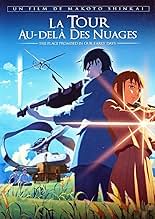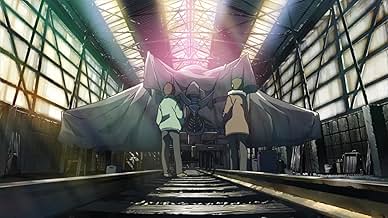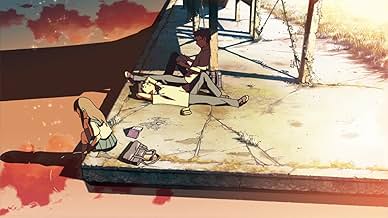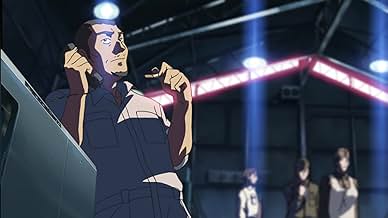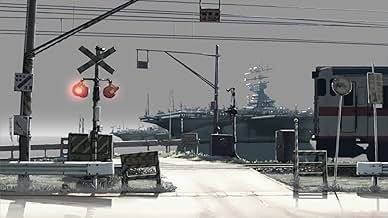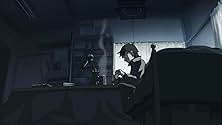CALIFICACIÓN DE IMDb
6.8/10
16 k
TU CALIFICACIÓN
En una línea de tiempo alternativa de la posguerra, Japón se divide entre el Norte controlado por la Unión y el Sur controlado por los Estados Unidos.En una línea de tiempo alternativa de la posguerra, Japón se divide entre el Norte controlado por la Unión y el Sur controlado por los Estados Unidos.En una línea de tiempo alternativa de la posguerra, Japón se divide entre el Norte controlado por la Unión y el Sur controlado por los Estados Unidos.
- Premios
- 1 premio ganado y 1 nominación en total
Yuka Nanri
- Sayuri Sawatari
- (voz)
- (as Yuuka Nanri)
Unshô Ishizuka
- Okabe
- (voz)
Rie Nakagawa
- Joshi Seito
- (voz)
- …
Maki Saito
- Joshi Seito
- (voz)
- (as Maki Saitou)
- …
Ian O'Neal
- NSA
- (voz)
Opiniones destacadas
Makoto Shinkai's feature film debut packs a number of elements that would later become his trademarks but its confusing plot, inconsistent flow & poor characterisation also makes it pretty much forgettable. An ambitious undertaking by the new filmmaker in town that exposes his inexperience as a storyteller and presents him biting off more than he can chew.
Makoto Shinkai came back. And this time he is not alone.
'The Place Promised in Our Early Days' is a pure and beautiful piece of work. This has probably the most beautiful visuals of all animations that I've seen ('Please Save My Earth' and some others are also beautiful but they all have different characteristics, I must say). Pictures themselves are beautiful, and it is no wonder how people call him the 'magician of light'.
My overall impression of this anime is that it's like a poet but with Sci-Fi to match with it. 'Voices of a Distant Star (Hoshi no koe)' was quite boring for me honestly. But with a similar structure and image, 'The Place...' seems to deliver much better what Makoto Shinkai wanted to deliver, even though its story is slightly loose here and there.
I do think, however, that it is 'too' consistent throughout - from Makoto Shinkai's authentic poetic and solitary, pure atmosphere to its story/drama, visuals (e.g. lighting), music etc (I must say that sound aspects outside music is not very well done but let's put that aside), pretty much everything. This strengthens the sense of purity this anime represents, but I really think it would be better to have more 'bandwidth' to it, so it can have more dynamics and life in it. It is great how Makoto Shinkai pulled it off gracefully knitted altogether, though. I'd say that 'The Place...' stands on its very own ground, really. I think it is something that's quite different to all the rest, and don't really think it's appropriate to judge this by typical standards.
To hold it together for a much longer period of time, and to do it well, he has effectively implied editing (if I could say that) and careful laying out of the story. But the biggest difference I witnessed from 'The Place...' was how Makoto Shinkai has casted much more characters than before - though characters lack in variety as well. This enriches the story as well as adding complexity and depth to it so you don't get bored out easily.
But after all, it is superb how well Makoto Shinkai has put the whole thing together so well. I was very fascinated and captured while I was watching it - which didn't happen for quite some time. I think this is one piece of work that overwhelms viewers by its beauty and sense of purity.
P.S. Although I can understand how some animatings are not up to the feature animation quality, I personally think it'd be better for Makoto Shinkai to get somebody good to retouch on his characters' faces.
'The Place Promised in Our Early Days' is a pure and beautiful piece of work. This has probably the most beautiful visuals of all animations that I've seen ('Please Save My Earth' and some others are also beautiful but they all have different characteristics, I must say). Pictures themselves are beautiful, and it is no wonder how people call him the 'magician of light'.
My overall impression of this anime is that it's like a poet but with Sci-Fi to match with it. 'Voices of a Distant Star (Hoshi no koe)' was quite boring for me honestly. But with a similar structure and image, 'The Place...' seems to deliver much better what Makoto Shinkai wanted to deliver, even though its story is slightly loose here and there.
I do think, however, that it is 'too' consistent throughout - from Makoto Shinkai's authentic poetic and solitary, pure atmosphere to its story/drama, visuals (e.g. lighting), music etc (I must say that sound aspects outside music is not very well done but let's put that aside), pretty much everything. This strengthens the sense of purity this anime represents, but I really think it would be better to have more 'bandwidth' to it, so it can have more dynamics and life in it. It is great how Makoto Shinkai pulled it off gracefully knitted altogether, though. I'd say that 'The Place...' stands on its very own ground, really. I think it is something that's quite different to all the rest, and don't really think it's appropriate to judge this by typical standards.
To hold it together for a much longer period of time, and to do it well, he has effectively implied editing (if I could say that) and careful laying out of the story. But the biggest difference I witnessed from 'The Place...' was how Makoto Shinkai has casted much more characters than before - though characters lack in variety as well. This enriches the story as well as adding complexity and depth to it so you don't get bored out easily.
But after all, it is superb how well Makoto Shinkai has put the whole thing together so well. I was very fascinated and captured while I was watching it - which didn't happen for quite some time. I think this is one piece of work that overwhelms viewers by its beauty and sense of purity.
P.S. Although I can understand how some animatings are not up to the feature animation quality, I personally think it'd be better for Makoto Shinkai to get somebody good to retouch on his characters' faces.
Approaching this from the perspective of a sci-fi enthusiast, I was pleasantly surprised to discover that, despite the complexity of its theories on divergent realities and their harmonic coexistence with dreams, there was a far simpler coming-of-age story that centered on a childhood promise. The score is haunting. The visuals and animation are stunning and the characters are charmingly awkward. Although there are some action sequences and a pint of blood thrown in for measure, the film's pace is decidedly that of a romantic reflection on loneliness and bittersweet affection. In the end, the story telling is adequate, but viewers who were eager to be exposed to fantastic alternate universes will be disappointed.
Makoto Shinkai is unique in his directing style in that he often places more focus on a character's inner thoughts rather than his or her dialogue and interacting with the environment. While this style has its own set of strengths and weaknesses, Shinkai uses it to his advantage to often show a emotion driven story. Such as is here in "The Place Promised in our Early Days." It is not a good as some of his other efforts, but it is still worth the watch nonetheless. The story is about three friends living in a alternate reality Japan. Japan has been split in have by America who controls the south and "the Union" controlling the north. There is a tower that goes beyond the clouds and the three friends make a promise to go fly up to it using a plane that they salvage and start to repair. One day, one of the friends disappear and story follows the other two friends and how they cope and ultimately try to find and help her. Like I said, the setting is in a alternate history and there are some science fiction influences in the world. However, it does not detract from the highlight which is he story. The first part of the story involves the three friends enjoying their summer. It is so genuine in terms of emotion and the bright lighting and beautiful drawn environments really brings the story to life. The character animations is not the best and the voice acting is OK at best, but the environments themselves are so beautiful that you'll easily forgive the previous complaints. Shinkai excels at portraying emotions of lost and isolation, especially when it involves old friends and lost lovers. It is no exception here. The main character is the most developed here as we hear his inner thoughts the most and his desire to see his lost friend again is interesting. As much as I like this movie, it is hard not to compare it to another Makoto Shinkai film, "5cm per Second." The reason I like that film better is because there was nothing that distracted the main story. It was clear and to the point with nothing distracting. Same can't be said for this movie. There is a lot of background here involving politics and a weird dream/ parallel universe science that gets convoluted and messy and at times, it can get distracting. That being said, if you want a movie with genuine emotion, this is not a bad watch. In a age where anime tends to focus less on story and more and cutesy hi jinks and everyday nonsense of high school students who can't get a girl, "The Place Promised in our Early Years" is a refreshing, emotional, and occasionally beautiful film that won't leave and tears in your eyes, but might leave you staring at the screen even after the credits start rolling.
The director and writer of The Place Promised in Our Early Days is a certain Makoto Shinkai who is otherwise famous for movies like 5 cm Per Second and Voices of a Distant Star. He has been hailed as one of the greatest anime directors or even the greatest, up there with legends like Hayao Myazaki. Since I saw his other two movies first and absolutely adore them, it is needless to say that my expectations for this movie were sky high. Simply put, I was not let down. Unlike the other two movies under the same direction, The Place Promised in Our Early Days has a very definite plot with clear dips, rises and climaxes. All in all, it is an exciting story that puts you in the center of a divided Japan with different powers controlling both sides. The plot might seem dry and overused on paper, but it is quite intriguing once you actually see it in action. Also driving the storytelling forward is this movie's sci-fi twist on parallel universes and how certain people react with them. Again, this movie certainly brings around one of the uniquer feeling tales around, even if it doesn't sound it. Anyone who has seen another Makoto Shinkai movie however will be able to tell you though, that it is not the story that makes his movies special, but the characters and the emotion that few movies come close to matching. Although it is still a huge distant beyond any other movie in this respect, the power behind to emotions is probably the weakest of all three movies. Don't get me wrong; you will still find the characters and their relations hauntingly and irresistibly real, but you aren't AS horrified when a character's life suddenly changes for the worse. Still, the feelings of loneliness, desperation, or exuberance, all of which Shinkai is famous for, are still found in their distinct, amazing way. Since this was the second of the three movies, it also seems as though it is a technical middle-step between the OK animation of Voices of a Distant Star, and the truly breath-taking visual found in 5 cm Per Second. The animation will not disappoint you, and there are some truly clever tricks that are used that make it look truly wonderful, but they won't stand out among the best in the industry. The music might just do that however with its beautiful, violin-heavy soundtrack that creates a great ambiance for whatever scene is currently playing. Also, the fact that the violin is featured in the soundtrack is of relevance to the plot, and makes both the character progression and the music appear that much sweeter.
Although I have criticized this movie a lot, for every thing it did wrong, it did a million things right. This still stands with the truly great anime movies out there and is a great watch for any fan of sci-fi influenced plots that will bring a surprisingly personal tone to the story.
Although I have criticized this movie a lot, for every thing it did wrong, it did a million things right. This still stands with the truly great anime movies out there and is a great watch for any fan of sci-fi influenced plots that will bring a surprisingly personal tone to the story.
¿Sabías que…?
- TriviaMakoto Shinkai intended to draw the background art himself but with an estimated 1000 cuts needed this would have been impossible for Shinkai to do alone and the film's animation producer, Kiyonori Hiramatsu went to Tokyo Art University to scout for artists. Adding to complications, many of the students were recruited from oil painting classes and had no experience in creating digital backgrounds and many hadn't even used PCs before.
- ErroresEnglish subtitles spell prophecies (used as a noun) as prophesies (the verb).
- Citas
Hiroki Fujisawa: [Narrating] Living alone, the nights seemed to last forever. When I couldn't pass the time effectively, I went to a nearby train station and pretended to wait for someone.
- Créditos curiososThere's a brief shot after the credits.
- ConexionesFeatured in WatchMojo: Top 10 Underappreciated Anime Movies (2016)
Selecciones populares
Inicia sesión para calificar y agrega a la lista de videos para obtener recomendaciones personalizadas
- How long is The Place Promised in Our Early Days?Con tecnología de Alexa
Detalles
- Fecha de lanzamiento
- País de origen
- Sitio oficial
- Idioma
- También se conoce como
- El lugar prometido
- Productora
- Ver más créditos de la compañía en IMDbPro
Taquilla
- Total a nivel mundial
- USD 90,298
- Tiempo de ejecución1 hora 30 minutos
- Color
- Mezcla de sonido
- Relación de aspecto
- 1.85 : 1
Contribuir a esta página
Sugiere una edición o agrega el contenido que falta

Principales brechas de datos
What is the French language plot outline for Kumo no mukô, yakusoku no basho (2004)?
Responda

